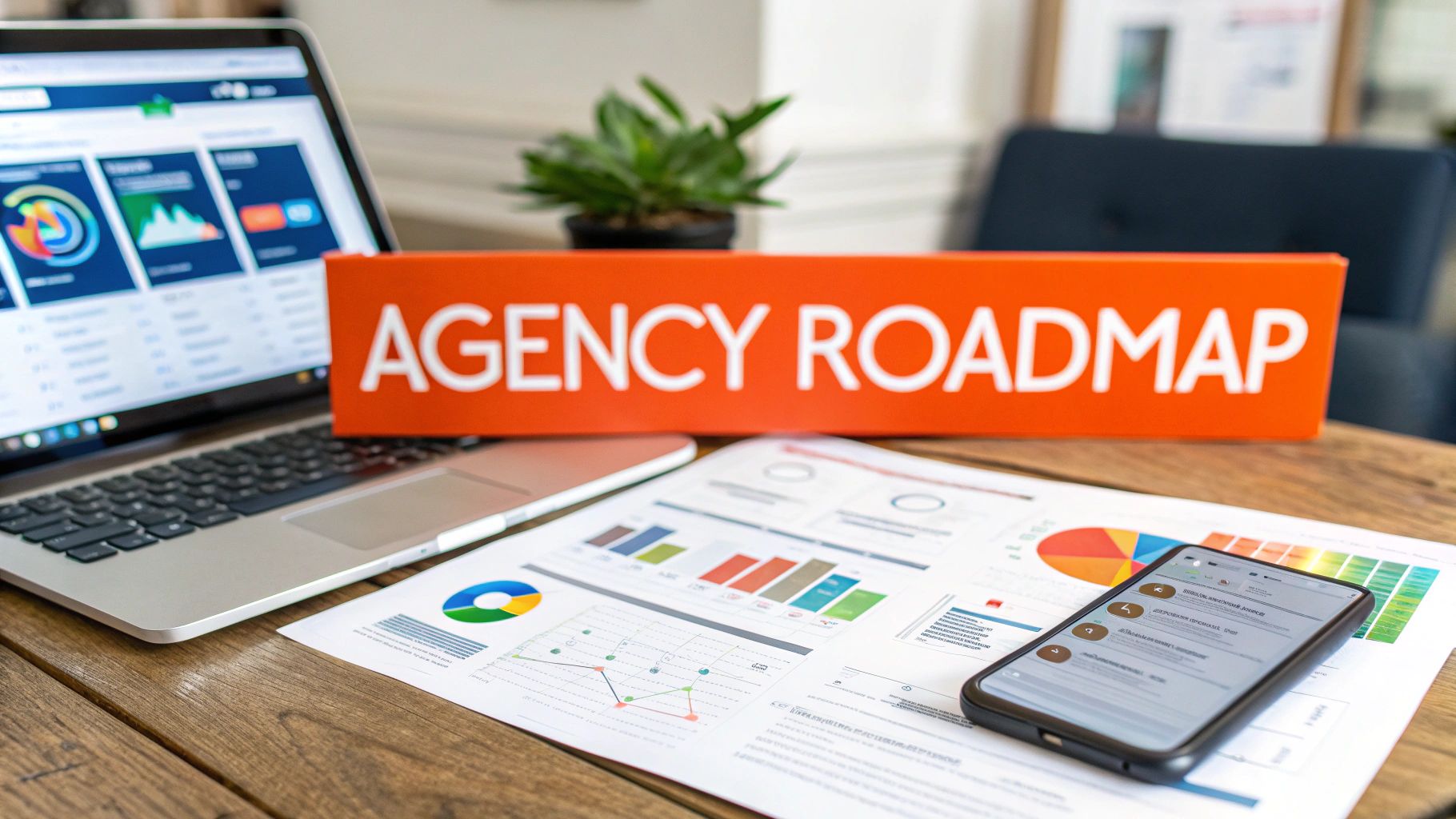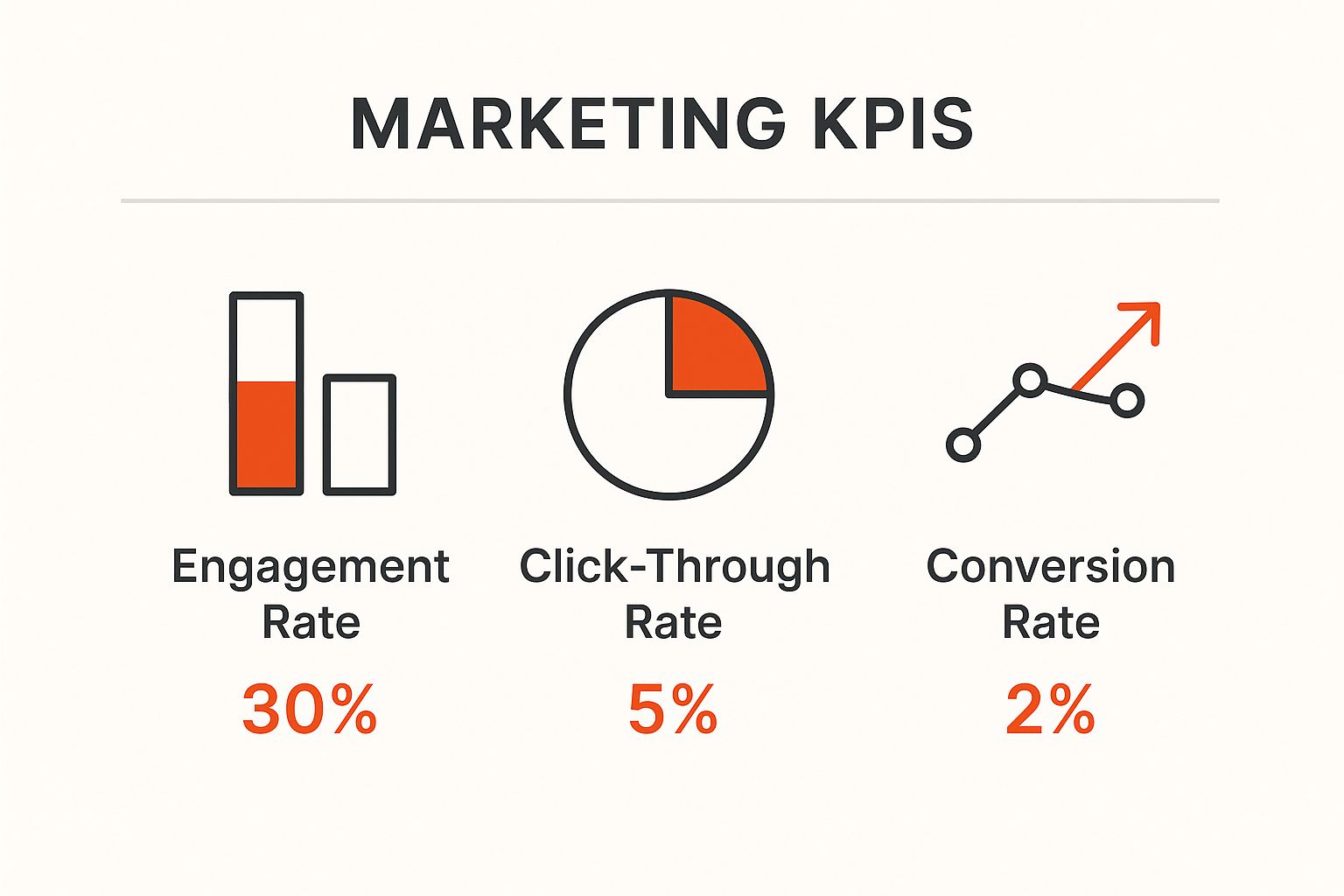
Choosing Social Media Marketing Agencies That Deliver
What A Social media Marketing Agency Brings To The Table
Social media marketing agencies step in as your strategic ally. They craft content calendars, manage online communities, and launch paid campaigns so your brand can cut through the noise. With specialists in copywriting, design, and ad management, they free up your team to focus on core business goals.
When done right, this partnership accelerates growth. For example, an agency might notice your competitor's audience is complaining about slow customer service on X (formerly Twitter). The agency then launches a proactive campaign highlighting your brand's 24/7 support, turning a competitor's weakness into your win. You’ll see stronger engagement, higher-quality leads, and a more cohesive brand voice across channels.
Laying The Groundwork For A Winning Partnership
Before you even fire off that first email to an agency, get granular about what you want. Vague ambitions like “more followers” won’t cut it. Instead, map out how success looks in your world—then share a brief that inspires real strategies, not cookie-cutter packages.
This prep work:
- Ensures your goals guide every creative concept.
- Helps agencies pitch ideas that align with your vision.
- Prevents wasted time chasing mismatched expectations.
Define Your Tangible Business Objectives
Broad aims produce broad results. Drill down on exactly what you need with specific, measurable goals.
Actionable Insight: Frame every objective with a number and a timeframe. Instead of "increase leads," specify "increase marketing qualified leads from LinkedIn by 20% in Q4." This gives an agency a clear target to build a strategy around.
- Generate 50 qualified sales leads per month from LinkedIn organic content and paid ads.
- Increase our share of voice in the B2B SaaS space by 10% within six months, measured by social listening tools.
- Grow e-commerce sales attributed to Instagram Shopping and Meta Ads by 15% in Q3.
Your objectives serve as the North Star, guiding platform selection, content themes, and the metrics you track.
With 5.42 billion people on social media and ad spend set to reach $276.7 billion by 2025, only pinpoint targets will help you stand out. For more on these trends, check out insights from Sprout Social.
Establish A Realistic And Comprehensive Budget
Your budget isn’t just the agency’s retainer. Think of it as a three-part investment:
- Agency Retainer: Monthly fee covering strategy, management, and reporting.
- Ad Spend: Dollars you’ll allocate to paid campaigns on platforms like Meta, TikTok, or LinkedIn.
- Content Creation Costs: Expenses for high-quality assets—think professional video shoots or influencer partnerships.
Practical Example: For a $10,000 total monthly budget, a realistic breakdown could be $5,000 for the agency retainer, $3,000 for ad spend, and $2,000 for content assets like a monthly video shoot. Laying these figures out up front means transparent conversations and no budgetary surprises down the line.
Your Agency Partnership Blueprint
Start your agency search from a place of clarity. Use this self-assessment to build a strong brief:
| Business Area | Question to Define | Concrete Example |
|---|---|---|
| Business Objectives | What exact outcome do we need from social media? | Generate 50 qualified sales leads per month via LinkedIn organic posts and paid ads. |
| Budget Allocation | How much can we invest each month in retainer, ads, and assets? | $5,000 for the agency retainer, $3,000 ad spend, and $2,000 for video production and design tools. |
| Key Performance Metrics | Which KPIs will tell us we’re winning? | Boost share of voice by 10% in six months and increase Q3 e-commerce sales by 15%. |
Running through these questions will sharpen your briefing documents and keep everyone aligned from day one.
A clear brief isn’t a nice-to-have—it’s the foundation of a partnership that drives real business results.
With objectives, budget, and metrics locked in, you’re ready to compare proposals, ask the right questions, and onboard a social media marketing agency that’s built for your success.
How to Vet an Agency's True Expertise
Every agency website is a highlight reel, packed with their biggest wins and most glowing testimonials. But to find a real partner, you have to look past the sales pitch and dig into how they actually work. Their true capabilities are always found beneath the surface.

The term "social media marketing agency" is incredibly broad. You could be talking to a small, creative shop that’s amazing at viral TikTok content for e-commerce brands, or you might be looking at a large firm with a whole division dedicated to complex B2B LinkedIn campaigns. The goal is to find the one whose expertise perfectly mirrors your needs.
For example, a software company trying to land enterprise clients needs an agency that lives and breathes professional networking platforms. If that sounds like you, our guide on https://redditagency.com/blog/b-2-b-social-media-marketing-strategies breaks down the specific strategies that work in that space.
Look Beyond Vanity Metrics in Case Studies
Case studies are an agency’s resume, but you have to learn how to read between the lines. It’s easy to get distracted by flashy vanity metrics like "impressions" or a spike in follower growth. While those numbers aren't meaningless, they don't tell the full story.
A genuinely impressive case study tells a clear problem-and-solution story.
- The Problem: What specific business challenge was the client actually facing? Think low-quality leads from social media or tanking e-commerce conversion rates.
- The Solution: What specific strategies did the agency deploy? Did they launch a hyper-targeted ad campaign on Meta or build an engaged community in a private Facebook group?
- The Outcome: How did their work impact the bottom line? Look for hard numbers like a 30% decrease in Cost Per Lead or an increase in Return On Ad Spend to 4:1.
Actionable Insight: When reviewing a case study, ask the agency, "If you ran this exact campaign for us today, what would you do differently?" Their answer will reveal their ability to learn and adapt, not just repeat past successes.
A great agency doesn’t just show you what they did. They explain why they did it and how it solved a problem just like yours. That’s the difference between simple execution and real strategic thinking.
Ask Pointed Questions That Reveal Their Process
The interview is your chance to get a feel for how an agency thinks, operates, and handles pressure. Generic questions will get you generic, rehearsed answers. You need to ask questions that force them to talk about their real-world experiences and workflows.
Essential Questions to Ask Potential Agencies:
- "Describe a campaign that didn't meet its initial goals. What did you learn, and how did you pivot?" This is a huge one. A practical example could be an agency admitting their initial ad creative wasn't resonating. A great answer would be, "We saw a low click-through rate in the first week, so we A/B tested new headlines and a different video thumbnail, which increased CTR by 50% in week two."
- "Walk me through your content creation and approval workflow." This gives you a window into their day-to-day process. You need to know who’s involved, how they handle feedback, and what you can expect for turnaround times.
- "Who on your team will be my day-to-day contact, and who is driving the strategy?" This is critical for understanding their team structure. Will you be working directly with a senior strategist or a junior account coordinator?
- "What tools are in your tech stack for scheduling, analytics, and social listening?" This tells you if they're investing in professional-grade software (like Sprout Social, Hootsuite, or Agorapulse) to manage campaigns efficiently and pull the data needed for optimization.
By asking these tougher questions, you get past the slick presentation and get a genuine feel for their expertise and whether they’d be a good cultural fit. This diligence is what separates a frustrating, ineffective partnership from one that truly drives your business forward.
Making Sense of Agency Proposals and Contracts
So, the proposals have started rolling in. This is where it gets real—and often, a little confusing. Every agency has its own way of presenting its services, and it's easy to get lost in a sea of slick pitch decks and buzzwords. Let's cut through the noise and figure out what actually matters.

The first thing to tackle is the money. How an agency charges for its work tells you a lot about how they operate and what kind of partnership you can expect.
Comparing Common Pricing Structures
You'll likely see a few different pricing models, but most will boil down to one of two approaches. Neither is inherently better—it's all about what fits your needs.
- Monthly Retainer: This is the most common model for ongoing social media management. You pay a set fee each month for a specific list of services. It’s great for budgeting because it’s predictable. The key here is to have that scope of work defined down to the last detail. You don't want any surprises.
- Project-Based Fee: This is a one-off price for a single campaign or project, like launching a new product or running a holiday promotion. This can be a fantastic way to "test drive" an agency without a long-term commitment. It's just not built for the day-in, day-out work of managing a social presence.
Of course, the price tag on the proposal isn't the whole story. You also need to account for ad spend and content creation costs, which all factor into the real social media marketing cost.
Watch Out for Red Flags and Vague Language
A good proposal is specific. A bad one is full of fluff. Your job is to spot the difference. Be on high alert for promises that sound impressive but are ultimately meaningless.
Vague commitments like "boost online presence" or "increase brand amplification" should set off alarm bells. If you can't attach a number or a clear KPI to a deliverable, it’s just a nice-sounding phrase.
Actionable Insight: Instead of accepting "community management," insist on specific deliverables. For example, your contract should state: "Respond to all comments and direct messages on Instagram and Facebook within 4 business hours, Monday-Friday, 9am-5pm." This transforms a vague promise into a measurable task. If they promise "content creation," ensure it specifies "12 static posts, 4 Reels, and 2 carousels per month for Instagram."
Don't hesitate to ask for a line-item breakdown. A transparent agency will have no problem explaining exactly what you're paying for. Getting everything crystal clear before you sign anything is the foundation of a successful partnership.
Why Platform-Specific Knowledge Is A Deal-Breaker
A great social media agency would never just copy and paste the same content across every channel. That's a rookie mistake. Real expertise comes from knowing the unique culture, audience expectations, and technical quirks of each platform. What kills it on one will absolutely bomb on another.
Think about it. Would you post a fast-paced, trending-sound TikTok video on a buttoned-up network like LinkedIn? Of course not. The tone would be completely off, your professional audience would be baffled, and your content would just disappear into the void. That's the essence of platform-specific know-how—understanding not just what to post, but where and why.
Going Beyond a Surface-Level Plan
You'll spot a truly valuable agency when they can clearly map out a different strategy for each platform that matters to your business. Their plan should be built on a solid understanding of how people actually behave on each app and what content formats resonate most.
For instance, a sharp agency can tell you exactly how they’d tackle two very different goals:
- To build a tight-knit community for a fitness app, they might recommend a private Facebook Group. They'd fill it with exclusive content like live Q&As with trainers, weekly workout challenges, and prompts for members to share their progress pics. This fosters a sense of belonging that a public page can't match.
- To drive B2B leads for a SaaS company, they’d pivot to LinkedIn. The focus there would shift to publishing insightful articles from the CEO, creating data-heavy carousel posts visualizing industry trends, and running hyper-targeted ads aimed at specific job titles like "VP of Marketing" in the tech sector.
This kind of detailed thinking proves they're not just "managing accounts." They're building a thoughtful, multi-channel strategy. A real partner gets that while Instagram is all about visuals, a platform like X (formerly Twitter) demands a different rhythm. For brands in that space, a specialized Twitter marketing agency can offer deeper expertise.
The image below gives you a sense of how different marketing goals play out across platforms, underscoring why a tailored approach is so critical.

As you can see, a high engagement rate on one platform doesn't automatically mean you'll see high conversions. This is exactly why a platform-specific strategy is essential for hitting your actual business objectives.
Matching Content Formats to Platform Strengths
The type of content you post is just as crucial as the message itself. Video is king right now, with nearly 46% of marketers saying it’s their primary focus. But not all video is created equal.
For example, by early 2025, a staggering 60.8% of American Facebook users said they preferred short-form videos on that platform over those on competing apps. While the average click-through rate for Facebook ads hovers around 0.9%, a killer video ad in the retail or fitness industry can easily push that well above 1%. You can dive deeper into 2025 marketing trends here to see just how much format impacts performance.
Understanding how strategic goals differ across major social media platforms is key to choosing the right agency. They should be able to articulate why they'd choose one platform over another for a specific objective, based on user mindset and content formats.
Platform Strategy at a Glance
| Platform | Core User Mindset | Primary Content Format | Business Goal Alignment |
|---|---|---|---|
| Discovery, Aspiration, Visual Inspiration | High-Quality Images, Reels, Stories | Brand Awareness, E-commerce, Influencer Marketing | |
| Connection, Community, News/Updates | Video, Live Streams, Community Groups | Community Building, Lead Gen, Local Business | |
| Professional Growth, Industry News, Networking | Articles, Text Posts, Carousel Docs | B2B Lead Gen, Talent Acquisition, Thought Leadership | |
| TikTok | Entertainment, Trends, Authenticity | Short-Form Vertical Video | Brand Awareness, User-Generated Content, Viral Marketing |
| X (Twitter) | Real-Time News, Conversation, Customer Service | Short Text, Memes, Threads, Video Clips | Customer Service, Brand Voice, Real-Time Engagement |
This table is just a starting point, but it illustrates how each platform serves a distinct purpose. A good agency lives and breathes these differences.
Here’s a pro tip: When you're interviewing agencies, ask them to pitch a single platform-specific content idea for your brand on the spot. For a coffee brand, a bad answer is "We'll post nice photos on Instagram." A great answer is, "We'll launch a 'Mugshot Monday' UGC campaign on Instagram Stories, asking followers to share their morning coffee setup for a chance to be featured, driving both engagement and brand loyalty."
Separating Data-Driven Agencies from the Rest
Let's be blunt: modern social media success is built on data, not guesswork. The best agencies out there operate like scientists, not just creatives. They use analytics as their compass to guide strategy and make constant improvements. Your mission is to find a partner who lives and breathes this philosophy.

This isn't just a trend; it's a fundamental shift. Today, more than 75% of top social media strategists use AI tools for everything from planning campaigns to creating content. The market for social listening tools alone is projected to explode from $9.61 billion in 2025 to $18.43 billion by 2030. That tells you everything you need to know about where the industry is heading.
What a Meaningful Report Actually Looks Like
Any agency can throw together a report with vanity metrics like follower growth and engagement rates. A truly data-driven partner, however, ties those numbers directly to your actual business goals. Their reports need to answer the crucial "so what?" question.
Instead of just showing you a 10% increase in reach, a great agency's report will show how that reach actually moved the needle.
- Customer Acquisition Cost (CAC): How much did it really cost to land a new customer from that last Instagram campaign?
- Return on Ad Spend (ROAS): For every dollar we put into ads, how much revenue did we get back?
- Conversion Rate: What percentage of people who clicked our link from Twitter actually signed up for the demo?
Practical Example: A valuable report doesn't just say, "The campaign got 500,000 impressions." It says, "The campaign got 500,000 impressions, which led to 5,000 link clicks, 150 webinar sign-ups, and ultimately, 10 new paying customers, giving us a 3:1 ROAS." This connects social activity directly to business revenue.
A sharp agency uses robust social media analytics not just to prove their worth, but to find the next big opportunity.
A top-tier agency doesn’t just report on what happened; they use data to tell you what should happen next. Their insights should directly inform your future campaigns and budget allocation.
The Right Questions to Ask About Their Tech Stack
An agency’s toolkit is a direct reflection of its capabilities. The software they use dictates how well they can manage campaigns, pull meaningful insights, and pivot when things aren't working. When you're talking to potential partners, it's time to get specific.
Key Questions to Uncover Their Data Expertise:
"What social listening tools do you use to monitor brand sentiment and see what our competitors are up to?" You're listening for names like Brandwatch or Sprinklr. This signals they’re serious about understanding the conversations happening in your space.
"How does AI actually factor into your content strategy or ad targeting?" A forward-thinking agency might talk about using AI to analyze top-performing content in your niche or to pinpoint new audience segments you've never even thought of.
"Can you walk me through how you attribute conversions from social media?" This question reveals their technical depth. Are they just using basic UTM parameters, or can they discuss more sophisticated multi-touch attribution models?
Asking these pointed questions helps you quickly filter out the agencies that are all talk. You want the ones who are genuinely using technology to get better results.
Common Questions About Hiring an Agency
https://www.youtube.com/embed/jIbXbeJMqrU
Stepping into the world of social media agencies can feel a bit like learning a new language. You’re bound to have questions, and getting straight answers is the only way you’ll feel confident in your decision. Let's walk through some of the most common things business owners ask when they start looking for an agency partner.
Naturally, one of the first things on everyone's mind is the budget. It’s the practical starting point that frames the entire conversation.
How Much Should I Expect to Pay?
The honest answer? It varies—a lot. The cost really hinges on what you need them to do. A small local business that just needs someone to schedule posts and handle basic community engagement might find retainers starting around $1,500 per month.
But if you’re a larger company looking for a sophisticated strategy across multiple platforms, complete with a hefty ad spend, you could easily be looking at $15,000 a month or more.
The most important thing is to demand a detailed proposal. A good one will break everything down, clearly separating the agency's management fee from your ad budget and any one-time costs for things like video shoots or graphic design projects.
"Your job will not be taken by AI. It will be taken by a person who knows how to use AI."
This really gets to the heart of what you're paying for. It’s not just about access to tools; it's about the agency's expertise in using those tools to get you results. You’re investing in their strategic brainpower.
Once you’ve wrapped your head around the potential investment, the next question is always about the payoff.
When Can I Realistically Expect to See Results?
This is where you need to have a little patience. While you’ll probably see some early activity—a bump in likes, comments, and followers—within the first 30 to 60 days, those are just surface-level metrics. The results that actually impact your bottom line, like a steady stream of qualified leads or a real increase in sales, typically take 3 to 6 months to show up.
That may sound like a long time, but that’s the runway an agency needs to do its job properly. During that period, they’re:
- Developing and fine-tuning the initial strategy.
- Running A/B tests to figure out what creative and targeting works best.
- Digging into the data to see what’s working and what isn’t, then optimizing from there.
Any agency worth its salt will give you a clear timeline with milestones. For example: "Month 1: Strategy and content pillar finalization. Month 2: Launch initial campaigns and begin A/B testing. Month 3: Analyze initial data and present optimized strategy for the next quarter." This kind of transparency is the bedrock of a good partnership.
Finally, as you’re weighing your options, you'll likely wonder about the different types of partners out there.
What Is the Difference Between an Agency and a Freelancer?
A great freelancer can be a fantastic asset. If you have a very specific, defined task—like writing blog posts or designing social media graphics—a skilled specialist can be a cost-effective way to get it done.
An agency, on the other hand, brings something completely different to the table. When you hire an agency, you’re not just getting one person. You’re getting a whole team: a strategist, a copywriter, a designer, an ads manager, and an account manager, all working together on your brand.
Practical Example: A freelancer might create a great video for you. An agency will do that, but also develop the strategy for where to post it, write the ad copy, manage the ad budget to target the right audience, respond to comments, and report back on how many leads that video generated. It's an end-to-end service.
This collective brainpower, plus their access to expensive enterprise-level tools and analytics software, is what you need for a complex, multi-channel strategy. In essence, you're not just hiring help; you’re plugging in an entire outsourced marketing department.
Ready to stop guessing and start winning on one of the internet's most powerful platforms? Reddit Agency specializes in turning authentic conversations into measurable traffic, leads, and customers. We handle the strategy, content, and engagement so you can see real ROI.
Find out how we can help you build a thriving community at https://redditagency.com.
Article created using Outrank